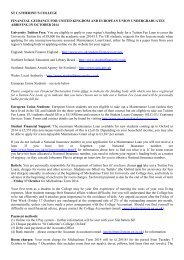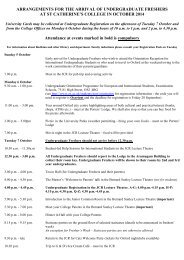Download PDF - St. Catherine's College - University of Oxford
Download PDF - St. Catherine's College - University of Oxford
Download PDF - St. Catherine's College - University of Oxford
Create successful ePaper yourself
Turn your PDF publications into a flip-book with our unique Google optimized e-Paper software.
CATZ RESEARCH<br />
Gaia Scerif Fellow & Tutor in Experimental Psychology<br />
on her research into human cognition<br />
2011-12 saw Gaia Scerif recognised by<br />
a number <strong>of</strong> prestigious bodies for the<br />
high quality <strong>of</strong> her teaching and research.<br />
She collected a Scholar Award from<br />
the James S McDonnell Foundation for<br />
her research proposal on the effects <strong>of</strong><br />
attention disorders, and the Margaret<br />
Donaldson Early Career Prize <strong>of</strong> the British<br />
Psychological Society for an ‘outstanding<br />
contribution to developmental psychology’.<br />
Meanwhile, the American Psychological<br />
Society nominated her a ‘Rising <strong>St</strong>ar’ in<br />
psychological research, and OUSU, the<br />
<strong>University</strong>’s <strong>St</strong>udent Union, awarded her<br />
with an ‘Innovation in Teaching’ Award.<br />
A fundamental question about human<br />
cognition is the extent to which it is<br />
predetermined to take its adult shape, or<br />
is instead malleable and dependent on<br />
learning from the environment. This issue<br />
naturally brings researchers to investigate<br />
the early development <strong>of</strong> cognitive functions,<br />
and theoretical positions have coalesced<br />
around distinct alternatives. Nativists<br />
propose that infants come to the world<br />
equipped with a sophisticated armament <strong>of</strong><br />
skills and conceptual knowledge. Claims <strong>of</strong><br />
innate specification <strong>of</strong> cognitive domains<br />
have been bolstered by dissociations <strong>of</strong><br />
function in individuals with developmental<br />
disorders, especially those associated with<br />
a known genetic aetiology. Constructivist<br />
accounts instead see environmental input<br />
as instrumental and question the notion <strong>of</strong><br />
developmental disorders as islets <strong>of</strong> intact and<br />
impaired ability.<br />
A way to turn impasse into dialogue is to<br />
ask how knowledge emerges through the<br />
active selection <strong>of</strong> information in a complex<br />
environment. Processes such as attentional<br />
control (the selection <strong>of</strong> information in the<br />
environment) gate further encoding into<br />
short-term and long-term memory. Attentional<br />
processes also provide the mental workspace<br />
necessary to ignore information, update<br />
knowledge and maintain it online. They<br />
therefore constrain learning about the world.<br />
While the development <strong>of</strong> attentional control<br />
influences learning in typically developing<br />
young children, who are amazingly attuned<br />
to selecting and encoding information,<br />
attentional deficits can lead to cascading<br />
effects across many domains <strong>of</strong> cognition.<br />
In this context, studying individuals with<br />
disorders <strong>of</strong> attentional control <strong>of</strong> well<br />
identified genetic aetiology from early<br />
childhood, rather than just in adulthood,<br />
opens doors to understanding how the<br />
structure <strong>of</strong> cognition emerges over time in<br />
genetically well constrained populations.<br />
With my team and collaborators, I have<br />
investigated pr<strong>of</strong>iles <strong>of</strong> early attention<br />
difficulties in developmental disorders that<br />
are either genetically or functionally defined,<br />
as well as their trajectories and outcomes<br />
on behaviour and cognition. Understanding<br />
how distinct attention disorders affect<br />
cognitive processes has required a prospective<br />
longitudinal approach and experimental<br />
paradigms that can tap attention in young<br />
and less able children. This is by no<br />
56/GAIA SCERIF
















